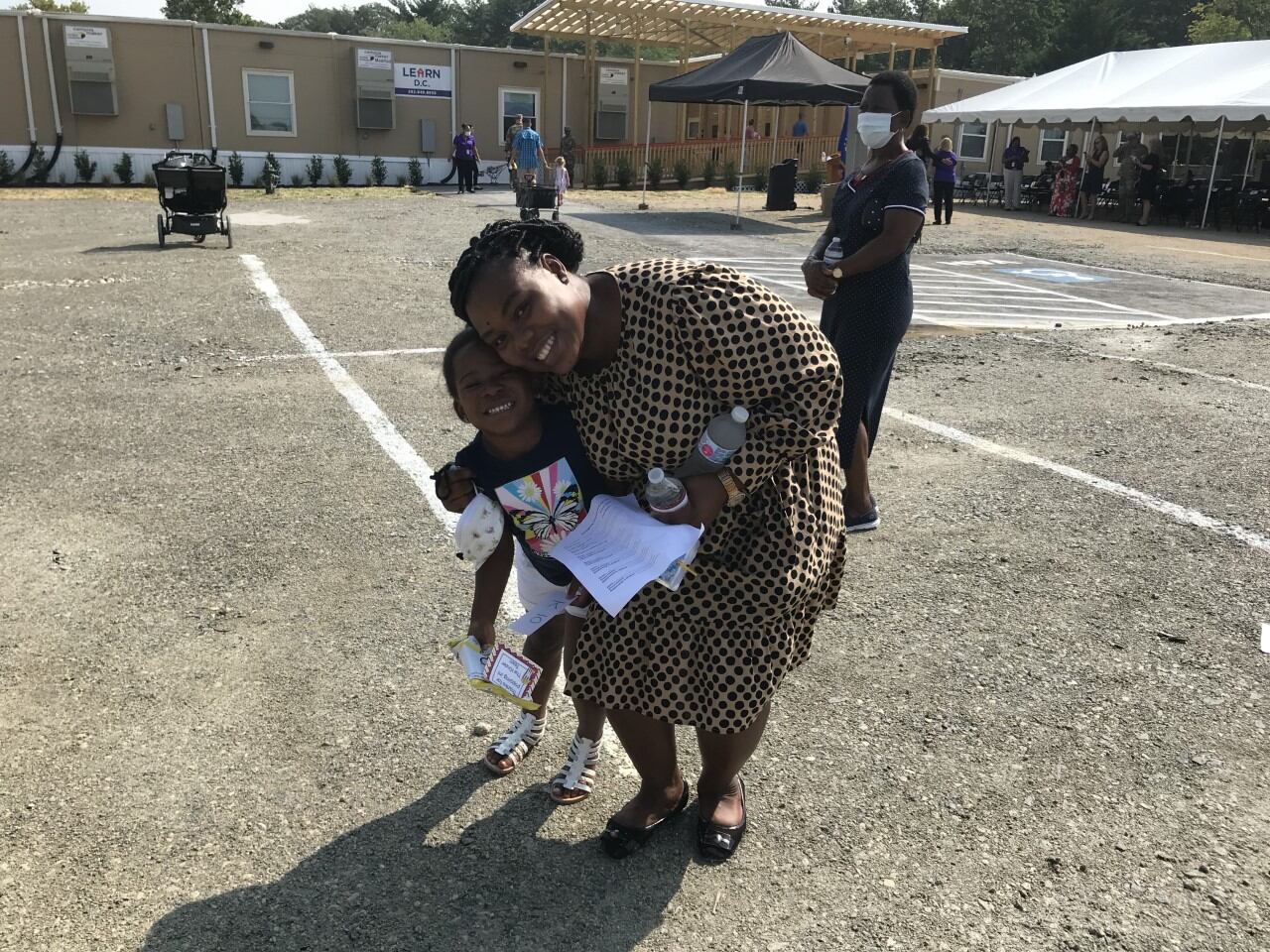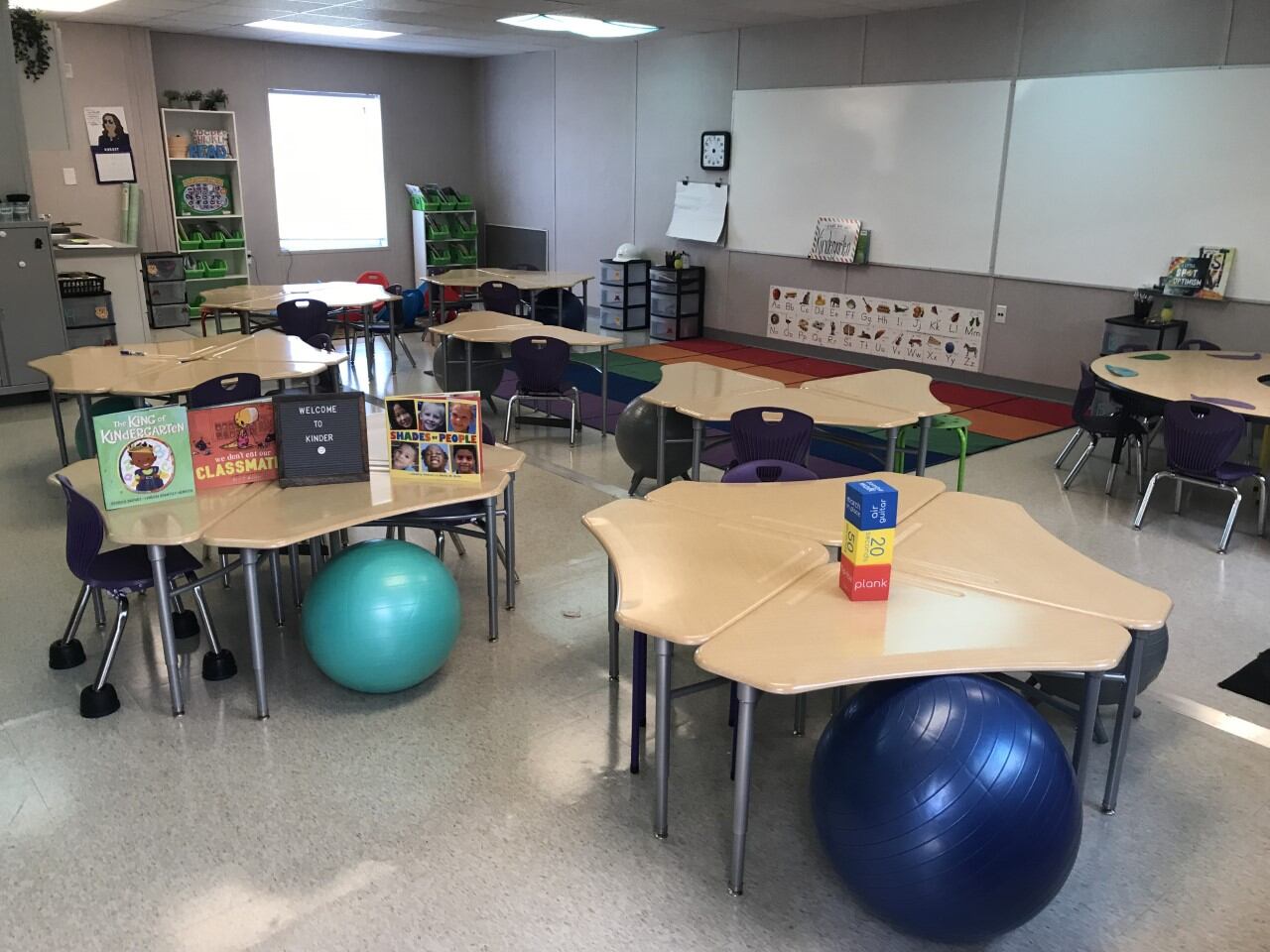JOINT BASE ANACOSTIA–BOLLING, WASHINGTON — Army Staff Sgt. Rosemary Okotie said she became “really excited” when she found out a new charter school was opening on this base in the nation’s capital.
Her daughter, Tega, 5, will attend kindergarten, and 3-year-old twins Garen and Brume will attend pre-kindergarten 3 at the school, which is within walking distance of their military housing.
Having her children attend a charter school is a huge plus, Okotie said, following the Aug. 26 ribbon-cutting ceremony. She’s looked at the school handbook and describes the curriculum as “awesome” and the staff’s level of education as “overwhelming.”
Asked if she’s excited about starting school, Tega exclaims, “Yes!” and proudly shows the bag of popcorn her teacher has given her. She reads aloud the message attached: “Thanks for popping in — Your Kinder Team.”
For many military parents, the quality of their children’s school is a primary factor in where they choose to live. A number of parents at the ribbon-cutting said the proximity of the school — within walking distance of their homes on base — is hugely important.
“The nature of the job, the military life with constant moving … it makes it easier having the school right on post,” Okotie said, noting that it simplifies her family’s logistics. Military housing is within sight of the school.
A number of military families at the joint base have been sending their children to schools that require an hour or more bus ride. The installation has provided buses to a number of area schools for years.
Louis Lambert, a retired Army first sergeant, said his oldest son, Louis, 12, has been on a bus two hours a day for years, and he is grateful that his 5-year-old son, Jeffrey, won’t be facing that same burden.
“I could walk a mile and pick him up from school if I wanted,” said Lambert, who lives on the installation.
Getting underway
The Learn DC public charter school, more than a decade in the making, began classes Aug. 30 with an initial capacity of 200 children in pre-K3 through first grade. The school will add one grade level and 50 additional students each year until the 8th grade, eventually reaching a maximum of 550 students. Students are starting the first year in temporary buildings on the six-acre site where permanent buildings will be constructed, starting in 2022.
There are 167 children enrolled with more than 60 on the waiting list, said Jill Gaitens, executive director of the Learn DC campus. In the midst of a teacher shortage, she said, they’re scrambling to hire more teachers. “We hire highly qualified, amazing teachers,” she said, and they seek out military spouses. Four military spouses are among the staff, including two teachers, the student support coordinator and an instructional assistant.
The school honors out-of-state teaching credentials, understanding the difficulties many spouses have in transferring their credentials as they move from state to state, said Gaitens, who has experienced some employment difficulties as an educator herself. She is the wife of a retired Marine and her son is an active-duty Marine.

There’s no charge to families for their children to attend the school. In addition to families who live on JBAB, it’s open to other children who live in Washington, D.C., with half of the slots provided to military children, and the other half going to children of civilian D.C. residents, using a lottery system.
Public charter schools in Washington, D.C. are funded in the same way as traditional public schools, Gaitens said. “We report our numbers to [D.C.’s] Office of the State Superintendent and receive per pupil funding,” she said. The school also receives federal funding, and has received grants from the Department of Defense for road improvements outside the base and from Ed Forward D.C. for start-up costs. The Learn Charter School Network, of which Learn DC is a part, received a federal Charter School Program grant to fund start-up costs, she said.
Learn operates 10 other public charter schools in Illinois, including two on Great Lakes Naval Station that have been operating for more than a decade; seven in the Chicago civilian community and one in Waukegan. The Great Lakes NS Learn charter schools are the only others on a military base.
“We would love to partner with the military,” said Greg White, CEO and president of Learn Charter School Network. “We’ve grown a passion for it. We love working with the military.”
A popular option
According to the Department of Defense Education Activity website, charter schools are becoming an increasingly popular option for military families. There are also public charter schools, operated by other entities, on seven other military installations: Little Rock AFB, Arkansas; Davis-Monthan AFB, Arizona; Vandenberg AFB and Beale AFB in California; Naval Air Station Key West, Florida; Naval Air Station Joint Reserve Base New Orleans; and Joint Base Andrews–Naval Air Facility Washington in Maryland.
The possibility of opening a school at Bolling AFB was first discussed in the 1960s, White said. But the initiative to bring a charter school to JBAB began in earnest more than a decade ago when parents from the base and Washington’s 8th Ward began advocating for expanded school choices in the area. The parents formed the Ward 8 Parent Operator Selection Team, or POST, which in 2016 selected the Learn Charter School Network to operate the school.
These parents were “experts in the needs of their community,” Gaitens said. “They wanted an academically excellent school with a positive and loving culture — one that understood the unique needs of children of military families who face the challenges of starting school in a new community every two years, and of Ward 8 students who face stresses such as poverty, violence and homelessness.
“In short, the parents were able to articulate needs that no educational expert could define on their behalf.”
During the ceremony, White quoted Tara Brown, a Ward 8 parent who was part of the team: “This school demonstrates what can be accomplished when you put good people together who are willing to work for the good of our children.”

“We know that opening a new charter school is hard,” White said. “Opening a a new charter school on a military base is hard. Opening a new charter school on a military base during a pandemic is really hard.”
Forging new friendships
Air Force Col. Mike Zuhlsdorf, commander of JBAB and the 11th Wing, thanked the parents “who raised their voices as one to start this process for change” and who overcame numerous challenges by “determination, persistence and partnership.”
Zuhlsdorf said he has a vision of the friendships that will be forged as military children share their experiences, perspectives and struggles with civilian D.C. students who will share their own life experiences and perspectives. As they contemplate their future, he said, he hopes their minds are filled with dreams of becoming teachers, first responders, entrepreneurs, activists, physicians, “even service members.”
“I’m hopeful that the diversity in these classrooms will not divide, but strengthen our bonds,” Zuhlsdorf said. “I’m inspired thinking about relationships that can be forged amongst parents in different walks of life — military and civilian — as we grow closer together as a community.”
Karen has covered military families, quality of life and consumer issues for Military Times for more than 30 years, and is co-author of a chapter on media coverage of military families in the book "A Battle Plan for Supporting Military Families." She previously worked for newspapers in Guam, Norfolk, Jacksonville, Fla., and Athens, Ga.
